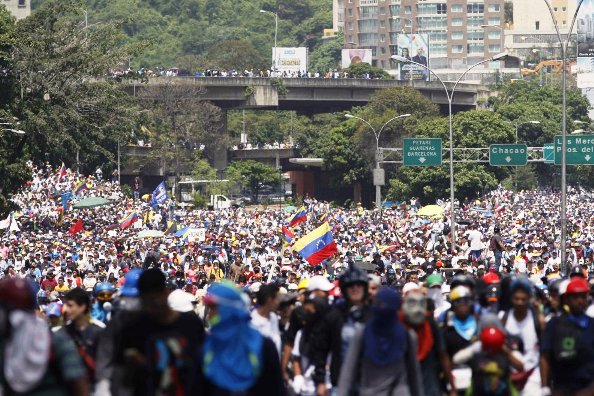
17 Jul 2017 | Focolare Worldwide
I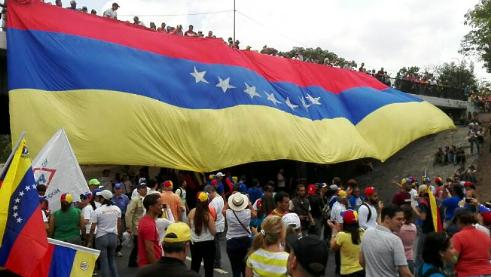 heard on TV… I’m watching the news, continually being interrupted by appeals from the public utility commission. The last one just said: “Urgently needed pharmacy drug…” My God! I jot down the telephone number and call. They tell me that person in need is an elderly woman, that it’s really urgent and that she lives in the same city as me. I quickly contact the lady’s children, but in this moment the situation on the streets doesn’t allow me to go out. We agree to meet the next day, early in the morning, in fron of the community health centre. When we finally meet, the lady asks me: “How much does the medicine cost?” I asked for it from the United States, but they weren’t able to send it to me.” “Nothing, ma’am,” I answer. “Let’s pray together that peace quickly returns to Venezuela.” We don’t know each other but hug and say goodbye. There is more happiness in giving than in receiving My friend calls me: “Do you by any chance have this medicine? I can’t find it anywhere . . .” It happened to be just the medicine that a woman had donated to my parish. In that moment I had thought: “But will this be useful to anyone?” It’s a very specific medicine…” It was jus the one my friend needed, with the exact dosage information – and there were 50 pills! God knows what each person needs. The happiness was shared, but mine was greater.
heard on TV… I’m watching the news, continually being interrupted by appeals from the public utility commission. The last one just said: “Urgently needed pharmacy drug…” My God! I jot down the telephone number and call. They tell me that person in need is an elderly woman, that it’s really urgent and that she lives in the same city as me. I quickly contact the lady’s children, but in this moment the situation on the streets doesn’t allow me to go out. We agree to meet the next day, early in the morning, in fron of the community health centre. When we finally meet, the lady asks me: “How much does the medicine cost?” I asked for it from the United States, but they weren’t able to send it to me.” “Nothing, ma’am,” I answer. “Let’s pray together that peace quickly returns to Venezuela.” We don’t know each other but hug and say goodbye. There is more happiness in giving than in receiving My friend calls me: “Do you by any chance have this medicine? I can’t find it anywhere . . .” It happened to be just the medicine that a woman had donated to my parish. In that moment I had thought: “But will this be useful to anyone?” It’s a very specific medicine…” It was jus the one my friend needed, with the exact dosage information – and there were 50 pills! God knows what each person needs. The happiness was shared, but mine was greater.  Create bridges with people from other Churches I received an SMS: “I would need this medicine, do you have it by chance?” Yes, I had it and asked Armando to take it over to him, since the one asking was an Evangelical like him. I also thought of asking: “If by any chance you any medicine that we’re looking for, would you return the favor?” She sent me the exact medicine that is hard to find in pharmacies, equipped with a nebulizer. She gave mine to another person who wasn’t able to expectorate because of a strong cough. I was an experience of the Gospel sentence: “Give and it will be given to you.” Moreover, the medicine I received was of a superior quality and with fewer side effects than the one I had before. It’s amazing: when you give, love is transformed into brotherhood. Sunday, day of rest… It’s Sunday!!! Finally I can get some rest! I planned on a very interesting film when, all of a sudden, the doorbell rings. I begin to fear that rest in relaxation is in danger. Seeing my reaction, my son asked if I would like him to tell the person at the door to come back at a nother moment. I almost say yes . . . but no . . . I’ll open it. I see an acquaintance standing there who asks me if I’m busy. She had an urgent look on her face. I let her in. “I just ahvef to talk with you…” “Okay, come in. My husband’s here too. Is it okay if he joins us?” We sit there for three hours listening to her. She tell us she wants a divorce, but before telling it to her husband and filing the papers, she thought of talking to us. It’s not easy to listen to her venting filled with pain, misunderstanding and anger…At the end, many of her doubts are clarified. We conclude with a prayer and the decision to start being the first to love. Thus she returns home with renewed strength and ready for the fight to save her marriage. It was a Sunday spent as the Day of the Lord, in which we think we did what Jesus would have done – loved without judging.
Create bridges with people from other Churches I received an SMS: “I would need this medicine, do you have it by chance?” Yes, I had it and asked Armando to take it over to him, since the one asking was an Evangelical like him. I also thought of asking: “If by any chance you any medicine that we’re looking for, would you return the favor?” She sent me the exact medicine that is hard to find in pharmacies, equipped with a nebulizer. She gave mine to another person who wasn’t able to expectorate because of a strong cough. I was an experience of the Gospel sentence: “Give and it will be given to you.” Moreover, the medicine I received was of a superior quality and with fewer side effects than the one I had before. It’s amazing: when you give, love is transformed into brotherhood. Sunday, day of rest… It’s Sunday!!! Finally I can get some rest! I planned on a very interesting film when, all of a sudden, the doorbell rings. I begin to fear that rest in relaxation is in danger. Seeing my reaction, my son asked if I would like him to tell the person at the door to come back at a nother moment. I almost say yes . . . but no . . . I’ll open it. I see an acquaintance standing there who asks me if I’m busy. She had an urgent look on her face. I let her in. “I just ahvef to talk with you…” “Okay, come in. My husband’s here too. Is it okay if he joins us?” We sit there for three hours listening to her. She tell us she wants a divorce, but before telling it to her husband and filing the papers, she thought of talking to us. It’s not easy to listen to her venting filled with pain, misunderstanding and anger…At the end, many of her doubts are clarified. We conclude with a prayer and the decision to start being the first to love. Thus she returns home with renewed strength and ready for the fight to save her marriage. It was a Sunday spent as the Day of the Lord, in which we think we did what Jesus would have done – loved without judging.
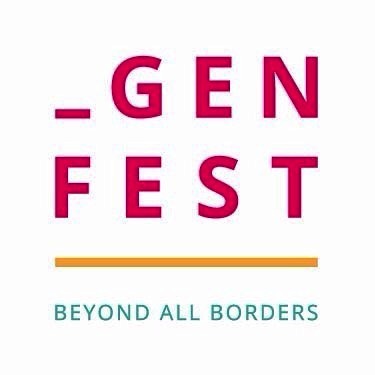
14 Jul 2017 | Focolare Worldwide
 A project that is already a real life experience, an invitation to build bridges of brotherhood and contribute to the tearing down of barriers of indifference, prejudice and selfishness. Begun in 1973 from an idea of Chiara Lubich, foundress of the Focolare Movement, the Genfest is a gathering of young people from across the globe. The 11th edition of Genfest will be held in Manila. The Genfest has turned out to be a festival of ideas and projects that inspire thousands of young people from different ethnic groups, cultures and religions to change and point their lives towards ideals of brotherhood and a united world. The main event will be held in the World Trade Centre Metro Manila, while all the workshops will be held at De La Salle University. BEYOND ALL BORDERS is the title of the next Genfest, which underscores the frontiers to be overcome both personally and as a society in order to build a happier and more united world, to breathe, love, work and live with an open and inclusive vision. The program will include musical and artistic performances, forums and expos. The Genfest’s logo can be summed up in one word: essential. “Less is more.” In a world where communications and information is too much, the message from Manila will be marked by simplicity and the power that every word can bring to the world. Therefore, the Genfest logo is made of only three letters and a simple line underneath the title. A stark symbol that calls us to beyond the borders, to underscore the only thing that matters in life: reaching out to everyone and moving together toward universal brotherhood. Contact us: info@y4uw.org Registration will begin from October 2017 Source: Y4UW International https://www.youtube.com/watch?v=C8NvjNYgNEc
A project that is already a real life experience, an invitation to build bridges of brotherhood and contribute to the tearing down of barriers of indifference, prejudice and selfishness. Begun in 1973 from an idea of Chiara Lubich, foundress of the Focolare Movement, the Genfest is a gathering of young people from across the globe. The 11th edition of Genfest will be held in Manila. The Genfest has turned out to be a festival of ideas and projects that inspire thousands of young people from different ethnic groups, cultures and religions to change and point their lives towards ideals of brotherhood and a united world. The main event will be held in the World Trade Centre Metro Manila, while all the workshops will be held at De La Salle University. BEYOND ALL BORDERS is the title of the next Genfest, which underscores the frontiers to be overcome both personally and as a society in order to build a happier and more united world, to breathe, love, work and live with an open and inclusive vision. The program will include musical and artistic performances, forums and expos. The Genfest’s logo can be summed up in one word: essential. “Less is more.” In a world where communications and information is too much, the message from Manila will be marked by simplicity and the power that every word can bring to the world. Therefore, the Genfest logo is made of only three letters and a simple line underneath the title. A stark symbol that calls us to beyond the borders, to underscore the only thing that matters in life: reaching out to everyone and moving together toward universal brotherhood. Contact us: info@y4uw.org Registration will begin from October 2017 Source: Y4UW International https://www.youtube.com/watch?v=C8NvjNYgNEc
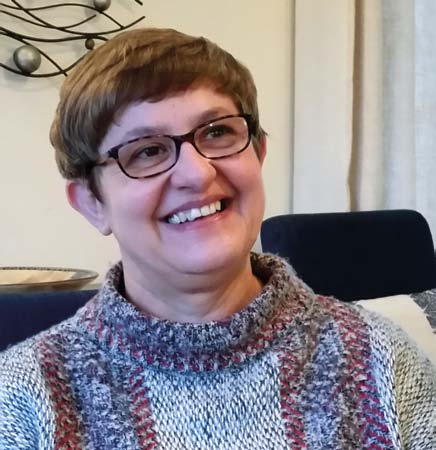
13 Jul 2017 | Focolare Worldwide, Senza categoria
 Elisa lives in the Focolare Centre in Welwyn Garden City, 35km north of London, in the County of Hertfordshire. It is a “garden city”, founded in the 1920s, with graceful neo-Georgian buildings, roses around the porches, tree-lined avenues. She recounts: “I was born in Northern Italy in a small village. The nearest city was Novara. I am the eldest and I have two brothers. My family was a very Christian family and gave us all solid values, such as always thinking of others. I was twenty, I had just finished studying and I was looking for a job. I studied French and English. Finding a job in a small town was difficult and I was very discouraged. Then a friend invited me to a meeting where plans were being made to go to a Genfest in Rome, a huge youth festival of the Focolare Movement at the Flaminio Stadium. It was May 1980. I went just to get away for the weekend. Instead I was was taken aback by the scene that met me, posters talking about a united world and tens of thousands of young people. During the first break I was in tears because I knew I had found something precious. I kept in touch with those people. I can’t put my finger on it but there was something that attracted me to the point that I went to every meeting. I started to visit the Focolare centre and gradually inside of I started to understand what I wanted to do with my life. It was to give my life to God through the Focolare. I got a job with Caritas, the social action of the Diocese. It was challenging and interesting. After three years I was asked by the Focolare to transfer to Bologna. But the priest tried to convince me not to leave. On that day, the Gospel reading at Mass said ‘Those who do not leave mother, father, fields… cannot be my disciples’. I felt as if Jesus was speaking directly to me. I left without delay. During the years 1985-1987, I attended the international school of formation in Loppiano (near Florence, Italy). And then … Africa! My first impression was like being in a film because everything was new and different. The next day I went into a chapel and I saw the tabernacle and I said: ‘You’re the same Jesus, I gave my life to you and I find you here too.’ Initially I spent one month in Fontem, Cameroon. Then I went to Nigeria and lived there for twenty years. In Lagos, in 1989, we started a project for girls who wanted to know more about the spirituality of unity. There was a religious sister who offered us accommodation in the staff quarters of her missionary hospital. Then a family gave us a house for five years free of charge. Later we found a piece of land and those same people, together with others, helped us build the first focolare house in Nigeria. Everything about that house came from providence. We started a small business making items in batik as one girl knew how to dye material. Someone in the community gave us some money in order to start it up. Everyone supported us and the project has helped countless girls over the years. In 2002 around one thousand people in Jos, northern Nigeria lost their lives in a clash between Muslims and Christians. No-one could understand how it had happened because these groups had always lived peacefully side by side. Our community asked if the Mariapolis could be held in Jos even though it was still a dangerous situation. There we spoke of dialogue, peace, reconciliation because there were a lot of physical wounds and emotional hurt. People had lost their businesses, places of worship had been destroyed. There was a lady invited by her sister and was one of the people inciting the boys from her village to fight against the rebels. At the end of the Mariapolis she said she had understood that violence was not the answer. The Bishop also came to the Mariapolis and was planning to undertake a reconciliation process for a month going from village to village. I subsequently went to Douala (Cameroon) where I lived for six years. Then, in 2013, I arrived in Great Britain and am now living in Welwyn Garden City. In my first year here it snowed from February to April! While externally everything is different, nothing has changed. Wherever God wants you to be, that is your home.” Source: New City Magazine (UK)
Elisa lives in the Focolare Centre in Welwyn Garden City, 35km north of London, in the County of Hertfordshire. It is a “garden city”, founded in the 1920s, with graceful neo-Georgian buildings, roses around the porches, tree-lined avenues. She recounts: “I was born in Northern Italy in a small village. The nearest city was Novara. I am the eldest and I have two brothers. My family was a very Christian family and gave us all solid values, such as always thinking of others. I was twenty, I had just finished studying and I was looking for a job. I studied French and English. Finding a job in a small town was difficult and I was very discouraged. Then a friend invited me to a meeting where plans were being made to go to a Genfest in Rome, a huge youth festival of the Focolare Movement at the Flaminio Stadium. It was May 1980. I went just to get away for the weekend. Instead I was was taken aback by the scene that met me, posters talking about a united world and tens of thousands of young people. During the first break I was in tears because I knew I had found something precious. I kept in touch with those people. I can’t put my finger on it but there was something that attracted me to the point that I went to every meeting. I started to visit the Focolare centre and gradually inside of I started to understand what I wanted to do with my life. It was to give my life to God through the Focolare. I got a job with Caritas, the social action of the Diocese. It was challenging and interesting. After three years I was asked by the Focolare to transfer to Bologna. But the priest tried to convince me not to leave. On that day, the Gospel reading at Mass said ‘Those who do not leave mother, father, fields… cannot be my disciples’. I felt as if Jesus was speaking directly to me. I left without delay. During the years 1985-1987, I attended the international school of formation in Loppiano (near Florence, Italy). And then … Africa! My first impression was like being in a film because everything was new and different. The next day I went into a chapel and I saw the tabernacle and I said: ‘You’re the same Jesus, I gave my life to you and I find you here too.’ Initially I spent one month in Fontem, Cameroon. Then I went to Nigeria and lived there for twenty years. In Lagos, in 1989, we started a project for girls who wanted to know more about the spirituality of unity. There was a religious sister who offered us accommodation in the staff quarters of her missionary hospital. Then a family gave us a house for five years free of charge. Later we found a piece of land and those same people, together with others, helped us build the first focolare house in Nigeria. Everything about that house came from providence. We started a small business making items in batik as one girl knew how to dye material. Someone in the community gave us some money in order to start it up. Everyone supported us and the project has helped countless girls over the years. In 2002 around one thousand people in Jos, northern Nigeria lost their lives in a clash between Muslims and Christians. No-one could understand how it had happened because these groups had always lived peacefully side by side. Our community asked if the Mariapolis could be held in Jos even though it was still a dangerous situation. There we spoke of dialogue, peace, reconciliation because there were a lot of physical wounds and emotional hurt. People had lost their businesses, places of worship had been destroyed. There was a lady invited by her sister and was one of the people inciting the boys from her village to fight against the rebels. At the end of the Mariapolis she said she had understood that violence was not the answer. The Bishop also came to the Mariapolis and was planning to undertake a reconciliation process for a month going from village to village. I subsequently went to Douala (Cameroon) where I lived for six years. Then, in 2013, I arrived in Great Britain and am now living in Welwyn Garden City. In my first year here it snowed from February to April! While externally everything is different, nothing has changed. Wherever God wants you to be, that is your home.” Source: New City Magazine (UK)
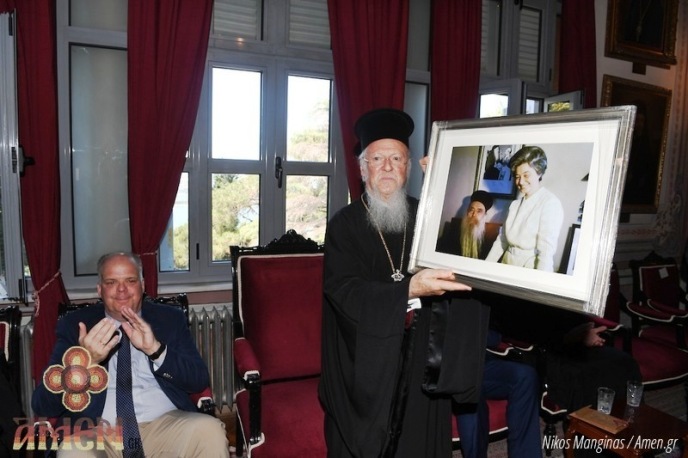
12 Jul 2017 | Focolare Worldwide, Senza categoria
Fi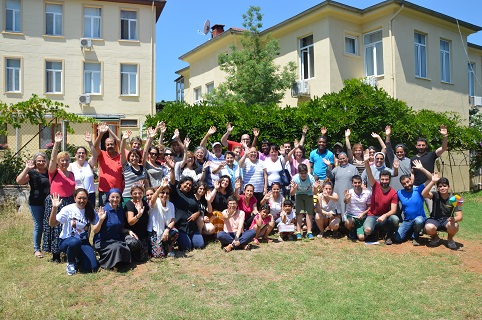 fty years have passed since that first quiet meeting which would produce unimagined openings between the Ecumenical Patriarch of the Orthodox Church and the Focolare Movement – They write from the Focolare of Istanbul -. A few weeks ago Metropolitan Gennadios Zervos said it in this way: “Up until today the full importance of that encounter has not yet been appreciated” (see Quel dialogo volute da Dio). We can have some sense of the vital force of that seed when we consider the first Honorary Doctorate in Culture and Unity that was conferred on Patriarch Bartholomew by Sophia University Institute in Loppiano, Italy, last October. That led to a project that is now a reality and enriches the formative offerings of the Institute with a permanent Chair for dialogue between the Orthodox Church and the Catholic Church, named after Patriarch Athenagoras and Chiara Lubich. On June 13th, the actual anniversary of their meeting, several of us gathered spontaneously at the Orthodox Patriarchate in Fanar. In front of the beautiful icon of Mary we concluded the day with the Magnificat, our song of thanksgiving: “The Mighty One has done great things…Holy is His Name.” But it was also a golden anniversary at the local Mariapolis held in Istanbul. Just as Pope Francis had visited the Mariapolis in the city of Rome last year, this year the citizens of the Mariapolis in Istanbul were joyfully honored by the visit of Patriarch Bartholomew. The School of Theology on the island of Halki with its splendid park provided the backdrop of an unforgettable celebration.
fty years have passed since that first quiet meeting which would produce unimagined openings between the Ecumenical Patriarch of the Orthodox Church and the Focolare Movement – They write from the Focolare of Istanbul -. A few weeks ago Metropolitan Gennadios Zervos said it in this way: “Up until today the full importance of that encounter has not yet been appreciated” (see Quel dialogo volute da Dio). We can have some sense of the vital force of that seed when we consider the first Honorary Doctorate in Culture and Unity that was conferred on Patriarch Bartholomew by Sophia University Institute in Loppiano, Italy, last October. That led to a project that is now a reality and enriches the formative offerings of the Institute with a permanent Chair for dialogue between the Orthodox Church and the Catholic Church, named after Patriarch Athenagoras and Chiara Lubich. On June 13th, the actual anniversary of their meeting, several of us gathered spontaneously at the Orthodox Patriarchate in Fanar. In front of the beautiful icon of Mary we concluded the day with the Magnificat, our song of thanksgiving: “The Mighty One has done great things…Holy is His Name.” But it was also a golden anniversary at the local Mariapolis held in Istanbul. Just as Pope Francis had visited the Mariapolis in the city of Rome last year, this year the citizens of the Mariapolis in Istanbul were joyfully honored by the visit of Patriarch Bartholomew. The School of Theology on the island of Halki with its splendid park provided the backdrop of an unforgettable celebration. 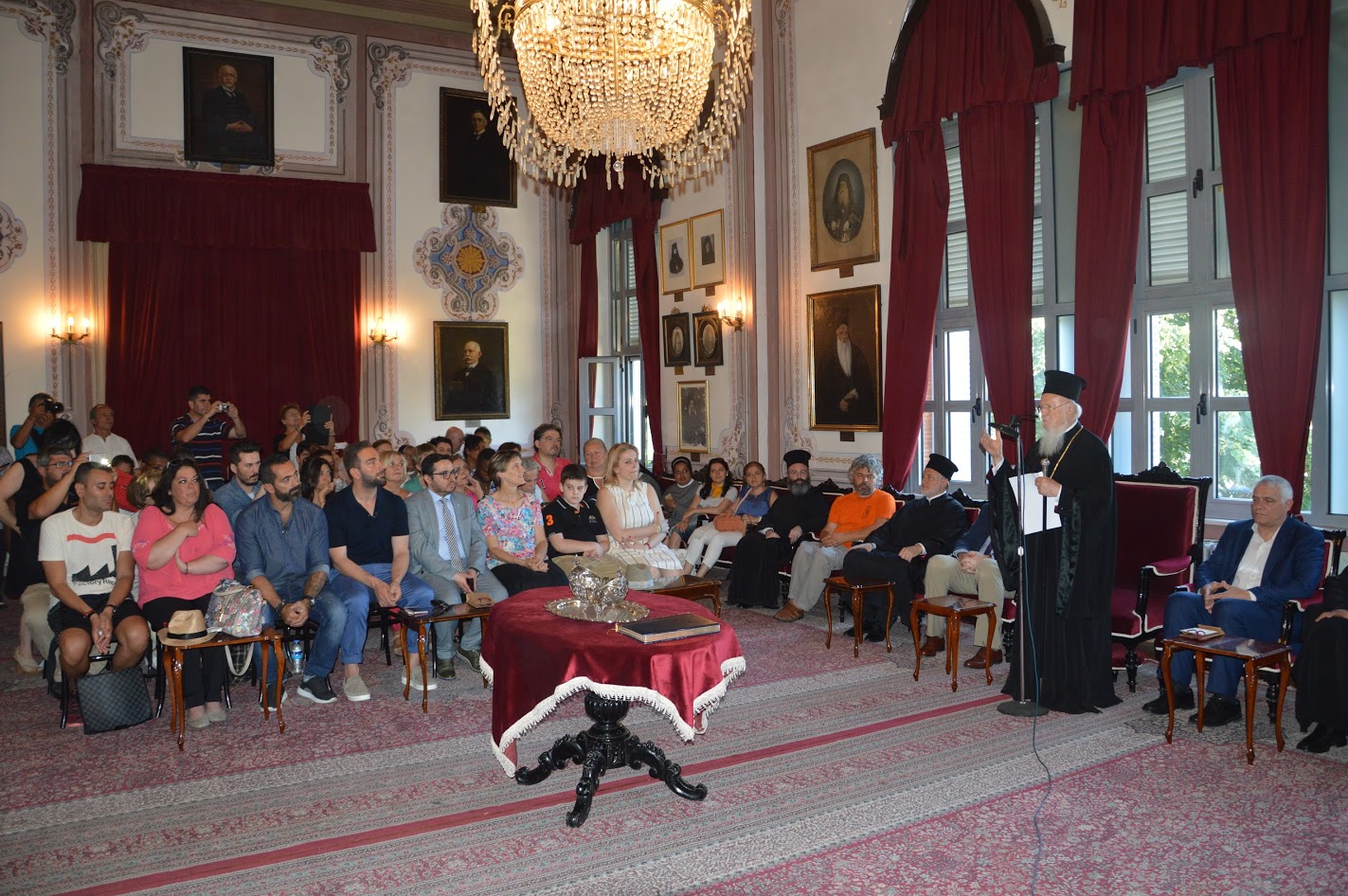 On Sunday, June 25th, the Mariapolites from a variety of confessions, nationalities and languages, went up to the hall where Patriarch Bartholomew gave his speech: “We are now talking about a story that is fifty years old, of a very strong bond between the Greek Patriarchate and the Focolare Movement. And we can by now call it a tradition, because Our predecessor Patriarch Demetrios had continued the relationship with Chiara and the Movement. And We have continued and brought forward that tradition for 26 years. We are very happy and it is a cause of great joy for Us that the major part of the years of this tradition were spent with Us.” We are not new to such expressions of affection and esteem from the Patriarch, but he always manages to surprise us. His joy because of the part he played for 26 years out of 50 is no formality, he told us! And speaking off-the-cuff he added: “But already before being patriarch, working beside my predecessors, I lovingly served this relationship. He went on to say: “I see that the good God has blessed you, because your number and your service have grown, because with the life and testament of Chiara that you have embraced, you give service to all humanity with the same pure heart, with the same faith, with the same love and with the same industriousness [as Chiara]. Like the blessing of Pope Francis, so too Our blessing and Our prayer is with you always that you might sow seeds of peace and of love in people’s hearts. May God always lead your steps toward good works.”
On Sunday, June 25th, the Mariapolites from a variety of confessions, nationalities and languages, went up to the hall where Patriarch Bartholomew gave his speech: “We are now talking about a story that is fifty years old, of a very strong bond between the Greek Patriarchate and the Focolare Movement. And we can by now call it a tradition, because Our predecessor Patriarch Demetrios had continued the relationship with Chiara and the Movement. And We have continued and brought forward that tradition for 26 years. We are very happy and it is a cause of great joy for Us that the major part of the years of this tradition were spent with Us.” We are not new to such expressions of affection and esteem from the Patriarch, but he always manages to surprise us. His joy because of the part he played for 26 years out of 50 is no formality, he told us! And speaking off-the-cuff he added: “But already before being patriarch, working beside my predecessors, I lovingly served this relationship. He went on to say: “I see that the good God has blessed you, because your number and your service have grown, because with the life and testament of Chiara that you have embraced, you give service to all humanity with the same pure heart, with the same faith, with the same love and with the same industriousness [as Chiara]. Like the blessing of Pope Francis, so too Our blessing and Our prayer is with you always that you might sow seeds of peace and of love in people’s hearts. May God always lead your steps toward good works.”  His speech was followed by an exchange of gifts, which included a framed photo of Athenagoras and Chiara during one of their meetings. Everyone then sang in several languages, including Greek, the Focolare song Love and you’ll understand which was a favorite song of Patriarch Athenagoras and describes the essence of the Mariapolis: the light that comes from loving. The Patriarch invited everyone to an exquisite lunch in the adjoining dining room and the morning concluded with the official photos, selfies and conversations with Bartholomew. “Golden is the inheritance left to us by Patriarch Athenagoras and Chiara, the protagonists and initiators of the ‘dialogue of Love,’ great creators of the dialogue of the people (…) initiators of the new ecumenical Era; they taught peoples, giving them courage, strength, patience, fidelity, willingness, love and unity” (Metropolitan Gennadios Zervos).
His speech was followed by an exchange of gifts, which included a framed photo of Athenagoras and Chiara during one of their meetings. Everyone then sang in several languages, including Greek, the Focolare song Love and you’ll understand which was a favorite song of Patriarch Athenagoras and describes the essence of the Mariapolis: the light that comes from loving. The Patriarch invited everyone to an exquisite lunch in the adjoining dining room and the morning concluded with the official photos, selfies and conversations with Bartholomew. “Golden is the inheritance left to us by Patriarch Athenagoras and Chiara, the protagonists and initiators of the ‘dialogue of Love,’ great creators of the dialogue of the people (…) initiators of the new ecumenical Era; they taught peoples, giving them courage, strength, patience, fidelity, willingness, love and unity” (Metropolitan Gennadios Zervos).
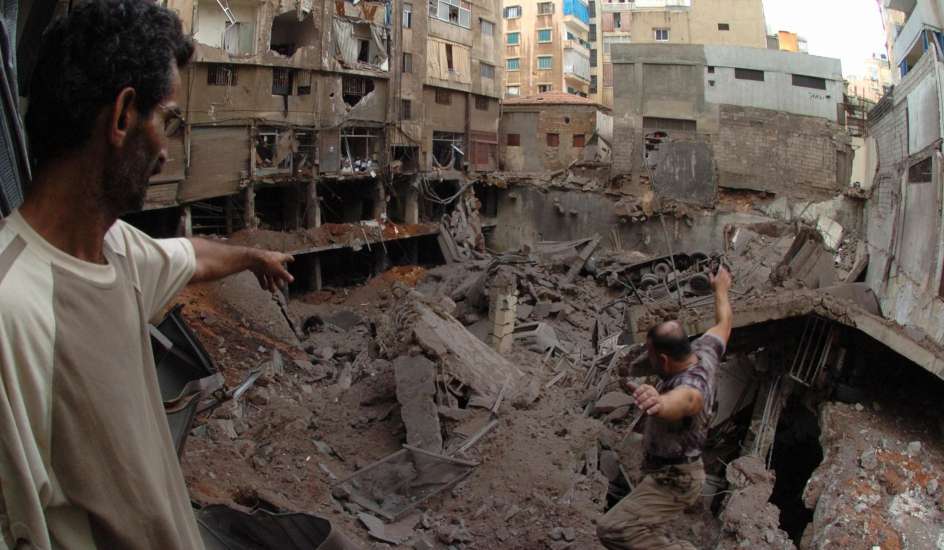
10 Jul 2017 | Focolare Worldwide
 “My country, Lebanon, was under Syrian control for many years. This is why serious tensions developed between the two countries. And it only got worse when a large number of Syrian refugees arrived: almost two million people. Compared to our 4.5 million inhabitants, it was almost half the population. “When the war began in Syria, some families from the Focolare community in Aleppo came to Lebanon to get away from the war for a while. After that, when the situation worsened in their country, they were no longer able to go back to their homeland and were taken in at a Focolare center. Within that hostile atmosphere, helping them was a decisive choice that went against everything. It meant that we had to make an effort to erase all the prejudices that the Lebanese have about Syrians. “We wanted to give witness to peace and love between us. We started by visiting them, building strong bonds with them. Parents, teens and kids – we all lent a hand so that these families wouldn’t feel alone in such difficult times. We spent the days together, organizing evenings and trying to lighten their load, listen and understand them. “While we could not resolve the problem between countries, we could at least build an oasis of peace around them. They didn’t have anything, having had to leave their country without bringing their things or clothes. We put what we had in common, collecting clothes in particular. These we offered them sensitively, since it was not easy for them to accept material help. “Their living conditions were hard. They were unemployed, in enemy territory, and often hoping to hear news about relatives or friends. We young people went to the beach together to try to ease the tense atmosphere. We started hanging out a lot, spending a lot of time together. We read the Word of Life so we could share our life experiences. We started to feel like we were part of the same family. “A year later, these families had to look for someplace to live. They were stressed and had a lot of financial difficulties. Yet together we believed in God’s providence. Searching with them for houses and work, we were quite aware of the difficulties we would face. We went into houses searching for somewhere for ‘our Syrian friends’ to stay, and we would get harsh reactions. For example, the apartment owners would charge extremely high prices in order to turn them away. “On their last day before leaving the center, one family still had not found a house or furniture. One of us reminded everyone that we had to have faith that God would intervene. To our great joy, the next day we found a house that didn’t cost anything, and someone else who was moving gave us their furniture, too. We also found schools for their children that cost very little. We started a French school with a group of teachers, which allowed the Syrian children to start school. “Now these families have left Lebanon and moved to Canada, Belgium or Holland. They wrote us to say that they felt so supported and at home in Lebanon. One family said, ‘Without the support of the Lebanese families, we would never have been able to start all over again so easily.’ “When they departed, they left what they had for other families who would come after them. Now we have three residences available that we use to help Syrian and Iraqi families who are in Lebanon before emigrating. We try to be always available to love them and safeguard these relationships of peace.”
“My country, Lebanon, was under Syrian control for many years. This is why serious tensions developed between the two countries. And it only got worse when a large number of Syrian refugees arrived: almost two million people. Compared to our 4.5 million inhabitants, it was almost half the population. “When the war began in Syria, some families from the Focolare community in Aleppo came to Lebanon to get away from the war for a while. After that, when the situation worsened in their country, they were no longer able to go back to their homeland and were taken in at a Focolare center. Within that hostile atmosphere, helping them was a decisive choice that went against everything. It meant that we had to make an effort to erase all the prejudices that the Lebanese have about Syrians. “We wanted to give witness to peace and love between us. We started by visiting them, building strong bonds with them. Parents, teens and kids – we all lent a hand so that these families wouldn’t feel alone in such difficult times. We spent the days together, organizing evenings and trying to lighten their load, listen and understand them. “While we could not resolve the problem between countries, we could at least build an oasis of peace around them. They didn’t have anything, having had to leave their country without bringing their things or clothes. We put what we had in common, collecting clothes in particular. These we offered them sensitively, since it was not easy for them to accept material help. “Their living conditions were hard. They were unemployed, in enemy territory, and often hoping to hear news about relatives or friends. We young people went to the beach together to try to ease the tense atmosphere. We started hanging out a lot, spending a lot of time together. We read the Word of Life so we could share our life experiences. We started to feel like we were part of the same family. “A year later, these families had to look for someplace to live. They were stressed and had a lot of financial difficulties. Yet together we believed in God’s providence. Searching with them for houses and work, we were quite aware of the difficulties we would face. We went into houses searching for somewhere for ‘our Syrian friends’ to stay, and we would get harsh reactions. For example, the apartment owners would charge extremely high prices in order to turn them away. “On their last day before leaving the center, one family still had not found a house or furniture. One of us reminded everyone that we had to have faith that God would intervene. To our great joy, the next day we found a house that didn’t cost anything, and someone else who was moving gave us their furniture, too. We also found schools for their children that cost very little. We started a French school with a group of teachers, which allowed the Syrian children to start school. “Now these families have left Lebanon and moved to Canada, Belgium or Holland. They wrote us to say that they felt so supported and at home in Lebanon. One family said, ‘Without the support of the Lebanese families, we would never have been able to start all over again so easily.’ “When they departed, they left what they had for other families who would come after them. Now we have three residences available that we use to help Syrian and Iraqi families who are in Lebanon before emigrating. We try to be always available to love them and safeguard these relationships of peace.”
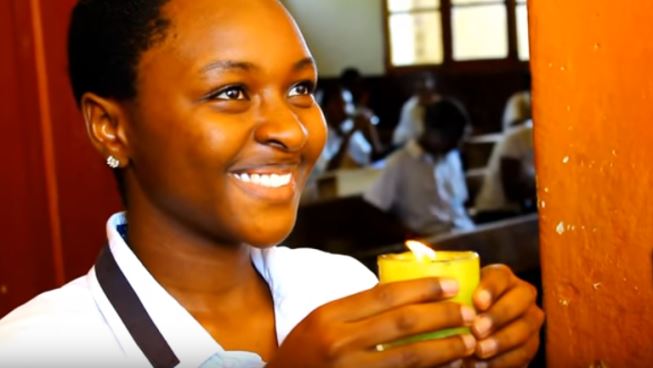
7 Jul 2017 | Focolare Worldwide
 After a violent 12-year civil war, Burundi is currently undergoing a political crisis that has generated great divisions among the institutions and citizens. There have been numerous demonstrations against the government and many young people were arrested. Homicides and abductions followed and many left their own villages and even the country. The gen, the youth of the Focolare, undertook to “live for their own people”, recognising in every difficulty of the suffering person, the countenance of Jesus crucified and forsaken, to love him concretely. “We went to help the many wounded- recounted Lewis – during one of the visits to a hospital in the capital we washed the clothes of the sick and shared our meals with some of them. We visited the children of an orphanage, and played and shared the afternoon with them, trying to make them happy. We took the occasion to give a hand also in the cleaning.” Many of the gen who are university students organised a “Peace conference, at the Burundi University, with the participation of many. “The hall which was full, confirmed how people really aspire for peace. Our musical group called the “Smiling Gen” performed, and was greatly applauded by all. Particularly the song “I Believe” (see the video) composed by them, encouraged our country’s youth to go against the current, and become aware of the suffering of others, with the invitation to do their share in changing the world. When we shot the video clip, we had to make an effort to go beyond the adverse situations around us and believe that despite all, peace is really possible.” To make their commitment more visible and effective, together with the local focolare community, the youths gave rise to the “Project for Peace in Burundi”which includes a series of initiatives in favour of peace and reconciliation: «Through theme conferences, radio programs, charity events, art, poetry and song contests, and a grand closing event, all, of which were diffused by the social media, we try to involve as many people as possible to join us in building peace in our country.” https://youtu.be/Q2fobgsqI7c
After a violent 12-year civil war, Burundi is currently undergoing a political crisis that has generated great divisions among the institutions and citizens. There have been numerous demonstrations against the government and many young people were arrested. Homicides and abductions followed and many left their own villages and even the country. The gen, the youth of the Focolare, undertook to “live for their own people”, recognising in every difficulty of the suffering person, the countenance of Jesus crucified and forsaken, to love him concretely. “We went to help the many wounded- recounted Lewis – during one of the visits to a hospital in the capital we washed the clothes of the sick and shared our meals with some of them. We visited the children of an orphanage, and played and shared the afternoon with them, trying to make them happy. We took the occasion to give a hand also in the cleaning.” Many of the gen who are university students organised a “Peace conference, at the Burundi University, with the participation of many. “The hall which was full, confirmed how people really aspire for peace. Our musical group called the “Smiling Gen” performed, and was greatly applauded by all. Particularly the song “I Believe” (see the video) composed by them, encouraged our country’s youth to go against the current, and become aware of the suffering of others, with the invitation to do their share in changing the world. When we shot the video clip, we had to make an effort to go beyond the adverse situations around us and believe that despite all, peace is really possible.” To make their commitment more visible and effective, together with the local focolare community, the youths gave rise to the “Project for Peace in Burundi”which includes a series of initiatives in favour of peace and reconciliation: «Through theme conferences, radio programs, charity events, art, poetry and song contests, and a grand closing event, all, of which were diffused by the social media, we try to involve as many people as possible to join us in building peace in our country.” https://youtu.be/Q2fobgsqI7c

 heard on TV… I’m watching the news, continually being interrupted by appeals from the public utility commission. The last one just said: “Urgently needed pharmacy drug…” My God! I jot down the telephone number and call. They tell me that person in need is an elderly woman, that it’s really urgent and that she lives in the same city as me. I quickly contact the lady’s children, but in this moment the situation on the streets doesn’t allow me to go out. We agree to meet the next day, early in the morning, in fron of the community health centre. When we finally meet, the lady asks me: “How much does the medicine cost?” I asked for it from the United States, but they weren’t able to send it to me.” “Nothing, ma’am,” I answer. “Let’s pray together that peace quickly returns to Venezuela.” We don’t know each other but hug and say goodbye. There is more happiness in giving than in receiving My friend calls me: “Do you by any chance have this medicine? I can’t find it anywhere . . .” It happened to be just the medicine that a woman had donated to my parish. In that moment I had thought: “But will this be useful to anyone?” It’s a very specific medicine…” It was jus the one my friend needed, with the exact dosage information – and there were 50 pills! God knows what each person needs. The happiness was shared, but mine was greater.
heard on TV… I’m watching the news, continually being interrupted by appeals from the public utility commission. The last one just said: “Urgently needed pharmacy drug…” My God! I jot down the telephone number and call. They tell me that person in need is an elderly woman, that it’s really urgent and that she lives in the same city as me. I quickly contact the lady’s children, but in this moment the situation on the streets doesn’t allow me to go out. We agree to meet the next day, early in the morning, in fron of the community health centre. When we finally meet, the lady asks me: “How much does the medicine cost?” I asked for it from the United States, but they weren’t able to send it to me.” “Nothing, ma’am,” I answer. “Let’s pray together that peace quickly returns to Venezuela.” We don’t know each other but hug and say goodbye. There is more happiness in giving than in receiving My friend calls me: “Do you by any chance have this medicine? I can’t find it anywhere . . .” It happened to be just the medicine that a woman had donated to my parish. In that moment I had thought: “But will this be useful to anyone?” It’s a very specific medicine…” It was jus the one my friend needed, with the exact dosage information – and there were 50 pills! God knows what each person needs. The happiness was shared, but mine was greater.  Create bridges with people from other Churches I received an SMS: “I would need this medicine, do you have it by chance?” Yes, I had it and asked Armando to take it over to him, since the one asking was an Evangelical like him. I also thought of asking: “If by any chance you any medicine that we’re looking for, would you return the favor?” She sent me the exact medicine that is hard to find in pharmacies, equipped with a nebulizer. She gave mine to another person who wasn’t able to expectorate because of a strong cough. I was an experience of the Gospel sentence: “Give and it will be given to you.” Moreover, the medicine I received was of a superior quality and with fewer side effects than the one I had before. It’s amazing: when you give, love is transformed into brotherhood. Sunday, day of rest… It’s Sunday!!! Finally I can get some rest! I planned on a very interesting film when, all of a sudden, the doorbell rings. I begin to fear that rest in relaxation is in danger. Seeing my reaction, my son asked if I would like him to tell the person at the door to come back at a nother moment. I almost say yes . . . but no . . . I’ll open it. I see an acquaintance standing there who asks me if I’m busy. She had an urgent look on her face. I let her in. “I just ahvef to talk with you…” “Okay, come in. My husband’s here too. Is it okay if he joins us?” We sit there for three hours listening to her. She tell us she wants a divorce, but before telling it to her husband and filing the papers, she thought of talking to us. It’s not easy to listen to her venting filled with pain, misunderstanding and anger…At the end, many of her doubts are clarified. We conclude with a prayer and the decision to start being the first to love. Thus she returns home with renewed strength and ready for the fight to save her marriage. It was a Sunday spent as the Day of the Lord, in which we think we did what Jesus would have done – loved without judging.
Create bridges with people from other Churches I received an SMS: “I would need this medicine, do you have it by chance?” Yes, I had it and asked Armando to take it over to him, since the one asking was an Evangelical like him. I also thought of asking: “If by any chance you any medicine that we’re looking for, would you return the favor?” She sent me the exact medicine that is hard to find in pharmacies, equipped with a nebulizer. She gave mine to another person who wasn’t able to expectorate because of a strong cough. I was an experience of the Gospel sentence: “Give and it will be given to you.” Moreover, the medicine I received was of a superior quality and with fewer side effects than the one I had before. It’s amazing: when you give, love is transformed into brotherhood. Sunday, day of rest… It’s Sunday!!! Finally I can get some rest! I planned on a very interesting film when, all of a sudden, the doorbell rings. I begin to fear that rest in relaxation is in danger. Seeing my reaction, my son asked if I would like him to tell the person at the door to come back at a nother moment. I almost say yes . . . but no . . . I’ll open it. I see an acquaintance standing there who asks me if I’m busy. She had an urgent look on her face. I let her in. “I just ahvef to talk with you…” “Okay, come in. My husband’s here too. Is it okay if he joins us?” We sit there for three hours listening to her. She tell us she wants a divorce, but before telling it to her husband and filing the papers, she thought of talking to us. It’s not easy to listen to her venting filled with pain, misunderstanding and anger…At the end, many of her doubts are clarified. We conclude with a prayer and the decision to start being the first to love. Thus she returns home with renewed strength and ready for the fight to save her marriage. It was a Sunday spent as the Day of the Lord, in which we think we did what Jesus would have done – loved without judging.



 fty years have passed since that first quiet meeting which would produce unimagined openings between the Ecumenical Patriarch of the Orthodox Church and the Focolare Movement –
fty years have passed since that first quiet meeting which would produce unimagined openings between the Ecumenical Patriarch of the Orthodox Church and the Focolare Movement – 

